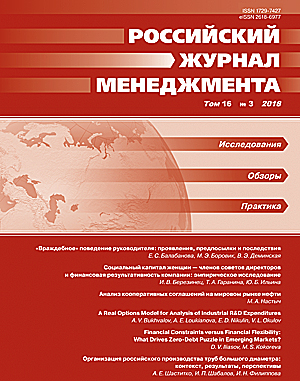«Враждебное» поведение руководителя: проявления, предпосылки и последствия
DOI:
https://doi.org/10.21638/spbu18.2018.301Аннотация
В статье представлены результаты исследования «враждебного» поведения руководителя (abusive supervision, ВПР) как регулярных практик унижения, подавления подчиненных, проявлений оскорбительного и грубого отношения к ним. Анализируются наиболее частые формы проявления ВПР, индивидуально-личностные и организационно-управленческие предпосылки данного феномена, а также последствия проявлений «враждебности» руководителей. Эмпирический анализ был проведен на основе стандартизованного онлайн-опроса 198 работников частных и государственных организаций. Результаты показывают, что наиболее часто респонденты сталкиваются с принуждением к исполнению рутинной и неквалифицированной работы; игнорированием своего мнения и инициатив; критикой в оскорбительной форме в присутствии коллег; обманом со стороны руководителей. Чаще всего респонденты связывают подобное поведение руководителей с демонстрацией личной власти и дефицитом коммуникативных навыков. Питательной средой для ВПР является прежде всего состояние экономической зависимости подчиненного от руководителя — система материальных вознаграждений, при которой размер выплат слабо связан с объективными показателями результативности работника или организации, но зависит от личных отношений подчиненного и руководителя. ВПР резко снижает показатели удовлетворенности работой, способствует профессиональному выгоранию и снижению вовлеченности в работу, подталкивает сотрудников к уходу из организаций.
Ключевые слова:
«враждебное» поведение руководителя, темная сторона лидерства, деструктивное лидерство, властные отношения в организации, экономическая зависимость
Скачивания
Библиографические ссылки
Translation of references in Russian into English
Загрузки
Опубликован
Как цитировать
Выпуск
Раздел
Лицензия
Статьи журнала «Российский журнал менеджмента» находятся в открытом доступе и распространяются в соответствии с условиями Лицензионного Договора с Санкт-Петербургским государственным университетом, который бесплатно предоставляет авторам неограниченное распространение и самостоятельное архивирование.





